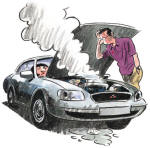Should I Get an Engine Flush?
When your oil change place recommends you get an engine flush, should you have it done? The answer is almost always a big NO. Not only is it usually a waste of money, sometimes it can actually cause engine problems.

An engine flush involves pouring a chemical solvent into your engine and running it for a little while, supposedly to breakup and flush out old sludge.
If you've had your oil services on schedule and used the correct oil, you shouldn't have a sludge buildup and you will only be wasting your money to have it done. If you haven't changed oil often enough or used regular oil on a turbo-charged engine you may have some accumulated. Usually the sludge accumulates at the top of the engine where most of it tends to stay there.
While you don't want sludge in the engine anywhere, you really don't want it clogging up small passages or control solenoids or plugging the oil pump inlet tube causing oil starvation to the engine. This is exactly what can happen when the solvent breaks up the sludge at the top of the engine and moves that broken up sediment around. If the oil pump inlet tube plugs up, unless you catch it in time and replace it, the engine will soon destroy itself.
Most auto manufactures recommend against engine flushes and they can void the warranty if it causes damage.
The best way to take care of a sludge problem in your engine if it hasn't already started causing problems, is change the oil more often and slowly dissolve any sludge moving around. For the price of the flush you can easily pay for another oil change. For the price of an engine repair you can easily pay to have the oil changed more often.
This service is often recommended to make the facility more money on an oil service.
A GM technical service bulletin states: "General Motors Corp. does not endorse or recommend engine crankcase flushing for any of its gasoline engines. Analysis of some of the aftermarket materials used for crankcase flushing indicates incompatibility with GM engine components and the potential for damage to some engine seals and bearings. Damage to engine components resulting from crankcase flushing is not covered under the New Vehicle Warranty."
A mild solvent can sometimes be helpful for stuck lifters or rings in older engines but use with caution if the engine has very much sludge buildup.
Oil change intervals
